In August 2020, we commissioned a global survey to gather views on change within the academic sector. The survey was sent to a random selection of 172,033 academics, librarians and students within Emerald’s literati community. A total of 1,274 literati from 188 countries responded.
The survey report covers attitudes to research impact evaluation, cultural challenges within academia, openness and transparency, and the role publishers can play in furthering change within the research ecosystem.
Use the 'On this page' and 'In the report' menus to quickly see and jump to content you're interested in, or scroll down to see what's here.
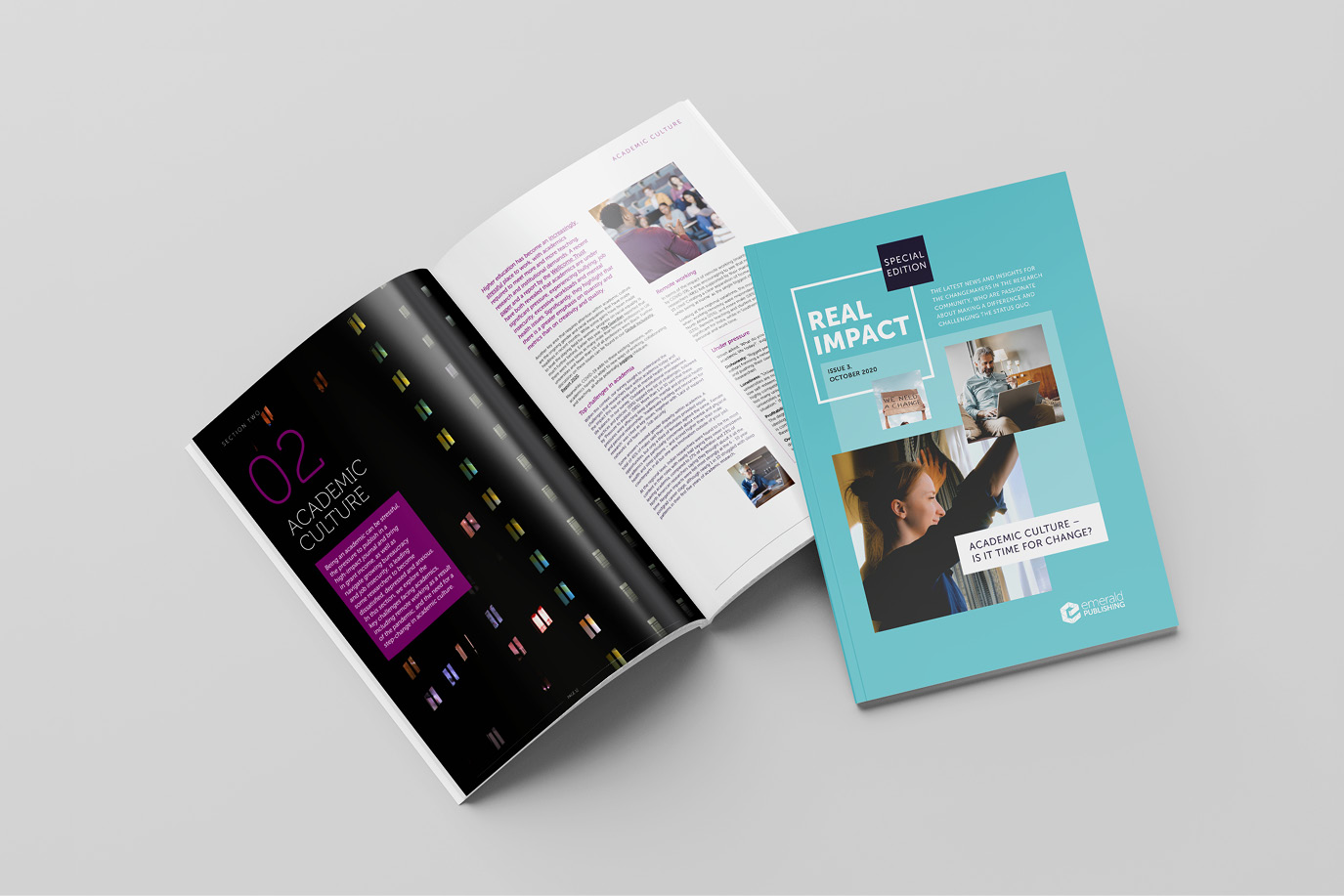
Academic culture
On this page, we take you through the headline findings of our Academic culture survey 2020, covering issues such as the pressures within academia and the impact on personal life.
Beyond this, we discuss academic culture in relation to diversity and inclusion, equal opportunities and access to mental health services.
Key themes
In our survey, ‘Outdated institutional management practices and policies’ (59%) topped the list of challenges, followed by ‘Pressure to publish’ (58%). More than 1 in 10 said that these pressures were affecting sleep patterns, mental and physical health and personal relationships. ‘Inadequate funding and resources for research’ was cited as key issues, together with ‘Lack of support networks’ and fears over ‘Job security’.
Some answers revealed gender disparity within academia. 45% of males said their institutions provided equal opportunities, but only a third of females agreed the same. Female academics were particularly concerned about mental and physical health and sleep patterns – and scored higher than their male counterparts in all but one area (motivation outside of your job).
At the regional level, Indian researchers were found to be the most content in their roles with nearly half saying they never considered leaving academia, compared to 27% of Australian and 23% of North American researchers saying they thought about it all the time. Negative impacts were felt most strongly at the 6- to 10-year postgrad career stage, although nearly 1 in 10 struggled with sleep patterns in their first five years of academic research.
How do you rate your institution's culture?
On a scale of 1 to 5 where 1 is not at all agree and 5 is strongly agree, how much do you agree your institution does well in the following areas?



|
On a scale of 1 to 5 where 1 is not at all agree and 5 is strongly agree, how much do you agree your institution does well in the following areas? |
Net agree (scored 4–5) |
|---|---|
| My manager is supportive | 48% |
| They actively support diversity & inclusion | 46% |
| They value personal development | 41% |
| They provide equal opportunities for all | 40% |
| They provide access to mental health services/support networks | 38% |
| They fairly reward and recognise the contribution of employees | 31% |
| They provide mentioning and networking opportunities | 32% |
| They take action when there are poor practices | 30% |
| They take action to ensure there is work/life balance | 28% |
Please type three key words that most describe the organisational culture in your institution.
Top three:
- Open
- Traditional
- Bureaucratic

Main pressures on academics today
What do you think are the main pressures in academic life today?
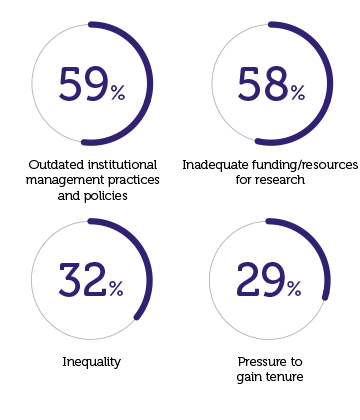
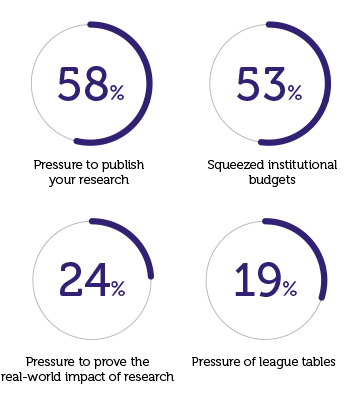

|
What do you think are the main pressures in academic life today? |
Net agree (scored 4–5) |
|---|---|
| Outdated institutional management practices and policies | 59% |
| Inadequate funding/resources for research | 58% |
| Pressure to publish your research | 58% |
| Squeezed institutional budgets | 53% |
| Lack of a support network | 38% |
| Job security/precarious contracts | 38% |
| Inequality | 32% |
| Pressure to gain tenure | 29% |
| Pressure to prove the real-world impact of research | 24% |
| Pressure of league tables | 19% |
Impact on personal lives
On a scale between large negative effect to large positive effect, how much of an impact does your job have on the areas below?
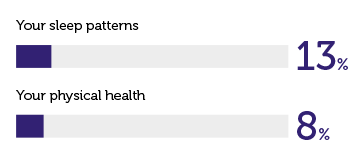
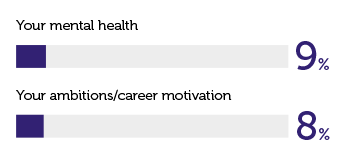
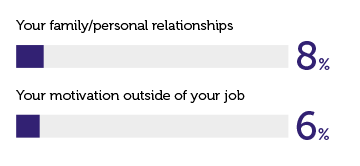
| On a scale between large negative effect to large positive effect, how much of an impact does your job have on the areas below? | Net agree (scored 4–5) |
|---|---|
| Your sleep patterns | 13% |
| Your mental health | 9% |
| Your family/personal relationships | 8% |
| Your physical health | 8% |
| Your ambition/career motivation | 8% |
| Your motivation outside your job | 6% |
Have you ever considered leaving academia due to the culture, practices or pressure?
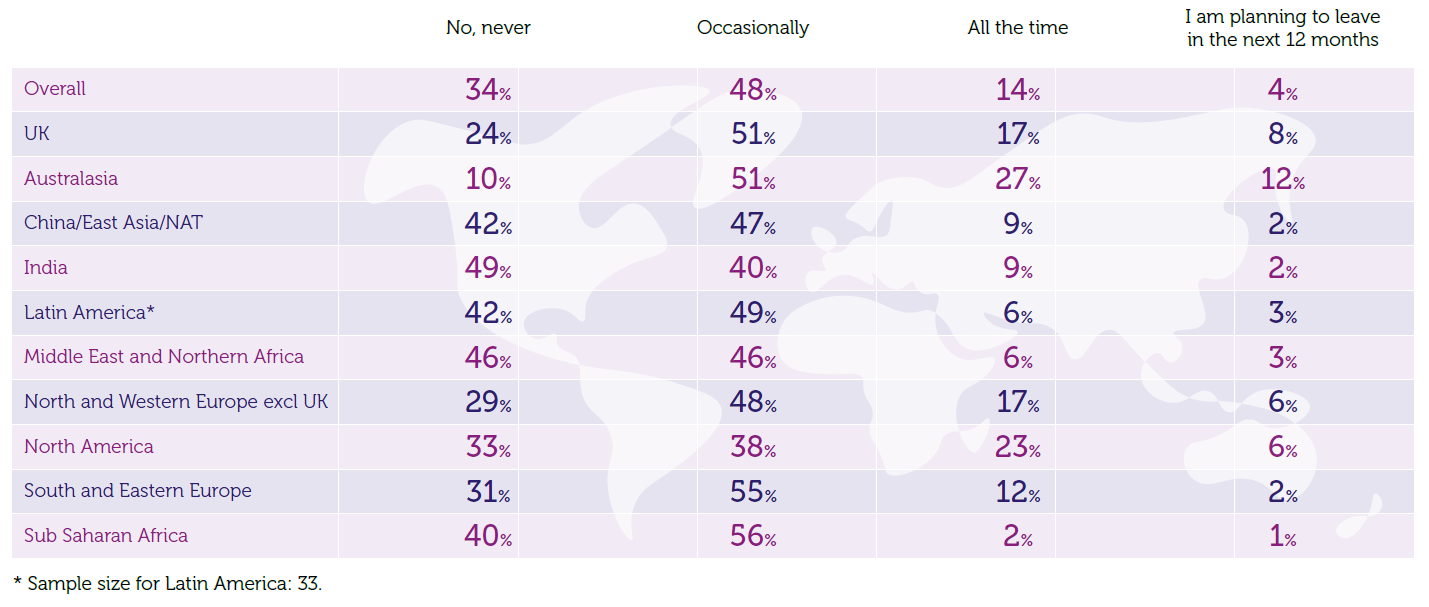
| No, never | Occasionally | All the time | Leaving within 12 months | |
|---|---|---|---|---|
| Overall | 34% | 48% | 14% | 4% |
| UK | 24% | 51% | 17% | 8% |
| Australasia | 10% | 51% | 27% | 12% |
| China/EA/NAT | 42% | 47% | 9% | 2% |
| India | 49% | 40% | 9% | 2% |
| Latin America* | 42% | 49% | 6% | 3% |
| ME&NA | 46% | 46% | 6% | 3% |
| N&WE excl UK | 29% | 48% | 17% | 6% |
| North America | 33% | 38% | 23% | 6% |
| S&E Europe | 31% | 55% | 12% | 2% |
| Sub Saharan Africa | 40% | 56% | 2% | 1% |
Sample size for Latin America: 33
Impact of remote working
What do you think is the main pressure of working remotely?
In terms of the impact of remote working (mainly driven by COVID-19), it was encouraging to see that nearly half of researchers (48%) felt supported by their manager, although 3 in 10 cited ‘Creating a clear separation of home life and work life while being at home’ as the single biggest challenge.
Looking at the regional variations, the most likely to feel isolated when working remotely were respondents in the Middle East and North Africa (25%), and more male (18%) than female researchers (13%). ‘Remote teaching and student engagement’ was most significant for India, while in southern Europe it was ‘Creating a clear separation between work life and home life’.
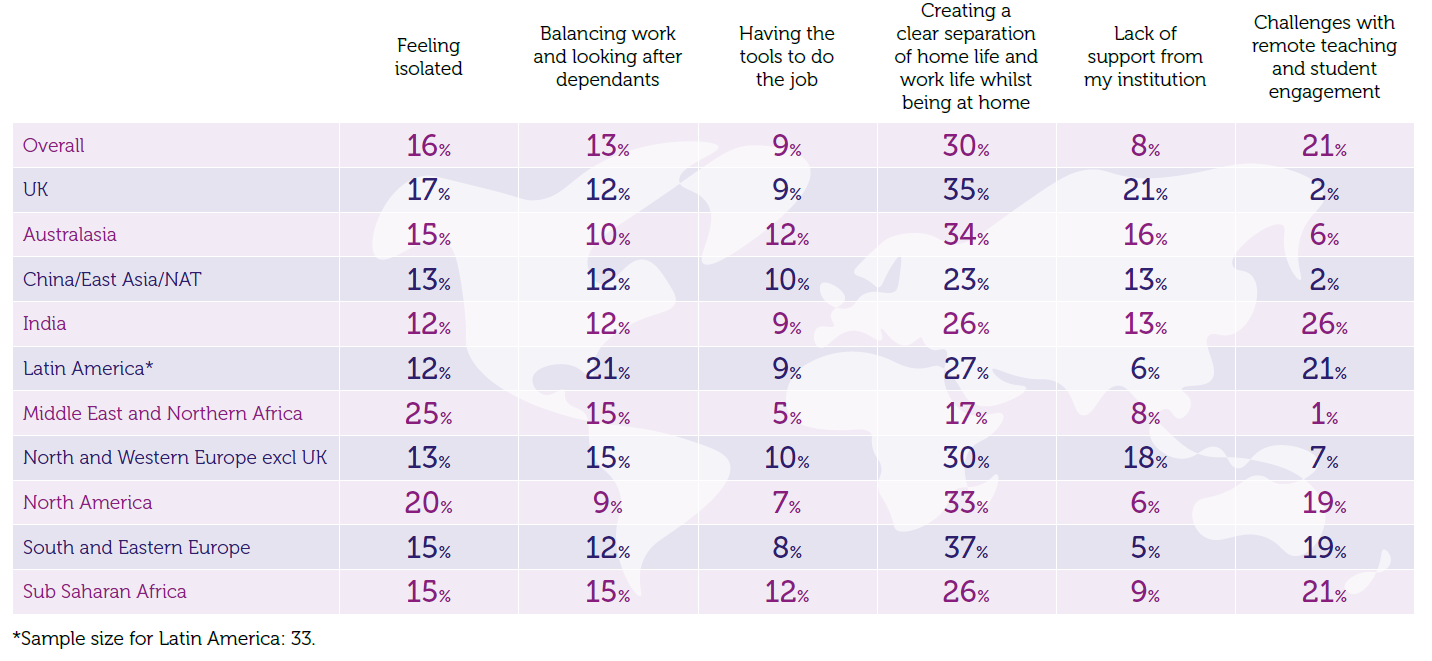
|
Large negative effect |
Feeling isolated |
Balancing work & dependants |
Having the tools to do the job |
Clear separation of home & work life at home |
Lack of support from my institution |
Challenges re remote teaching & student engagement |
|---|---|---|---|---|---|---|
|
Overall |
16% |
13% |
9% |
30% |
8% |
21% |
|
UK |
17% |
12% |
9% |
35% |
21% |
2% |
|
Australasia |
15% |
10% |
12% |
34% |
16% |
6% |
|
China/EA/NAT |
13% |
12% |
10% |
23% |
13% |
2% |
|
India |
12% |
12% |
9% |
26% |
13% |
26% |
|
Latin America |
12% |
21% |
9% |
27% |
6% |
21% |
|
ME&NA |
25% |
15% |
5% |
17% |
8% |
1% |
|
N&WE excl UK |
13% |
15% |
10% |
30% |
18% |
7% |
|
North America |
20% |
9% |
7% |
33% |
6% |
19% |
|
S&E Europe |
15% |
12% |
8% |
37% |
5% |
19% |
|
Sub Saharan Africa |
15% |
15% |
12% |
26% |
9% |
21% |
Sample size for Latin America: 33
Your words & comments
Under pressure
When asked, ‘What do you think are the main pressures in academic life today?’, suggestions included:
Dishonesty: “Rigged peer review network with some editors forming a network to publish their own circle’s work and pushing their own papers to be cited.”
Female, India, Researcher
Loneliness: “Universities vary. […] Many people within universities are not particularly happy, can be lonely, have low self-esteem, and so on. The classic symptoms of a highly competitive individualistic culture are present in too many university departments. The feminisation of universities and increasing diversity of many may help this situation.”
Male, Australasia, Professor
Profitability: “I would summarise all of the above as follows. The degree of corporatisation is ridiculous. The underlying ideology of accountability is sound. However, the ideology is completely lost in the implementation..”
Male, Australasia, Researcher
Overload: “More work by less people in less time [...] it doesn’t work and is causing burn out. We want to do the job well, but we are expected to do so much more than what is truly academic.”
The Emerald view
Vicky Williams, CEO at Emerald Publishing, calls attention to some of the major systemic challenges within academia and the broader research ecosystem, as well as Emerald’s vision to drive change for a more equal, diverse and inclusive research culture.
![]()
The results of this latest survey support a growing view that academia’s culture and incentive structures need reimagining. Key areas for change include the practices and policies towards equality, diversity and inclusion (EDI), particularly around hiring and promoting faculty and non-academic staff at the senior level. The same is true for incentive structures and ranking systems, which are designed to favour sameness, commonality, mould and ideal.
These kinds of perceptions were highlighted in our Global inclusivity report 2020, which revealed that 55% of people in higher education want academia to address the lack of inclusivity within academic culture, while just over a third (36%) believe that incentives in academia work against the definition of inclusivity.
There are numerous failings within existing incentive structures, including the influence of journal impact factors (JIFs) on hiring, tenure and promotion, and in some regions of the world, even the size of office allocated. The good news is that this practice is being challenged and in recent years there has been a push towards a structure that assesses and rewards researchers according to the quality of their contributions and the broader impacts of their work, rather than on where and in what form they publish. DORA (Declaration on Research Assessment) is indeed a significant step forward in changing the status quo, but signatories need to be held to account as to what their commitment means in practice.
The publishers’ role
Publishers clearly have a responsibility to stop propping up academia’s current incentive structures – which we all benefit from – and to make the system equal, diverse and fair. We need to focus on discoverability, open research and diversity of research outputs, while simultaneously ensuring our editors, editorial boards and peer review processes support diversity. Fundamentally, we must move beyond the traditional article and silo-based approach to enable contributions to be recognised in different ways.
It is evident that scholarly publishing often mirrors academia in terms of its lack of diversity, so publishers have an additional responsibility to make changes throughout their organisations. For example, if we are to develop the right products for a diverse audience, we must challenge our recruitment practices, as well as engage in new activities such as co-creation.
Committing to equality, diversity & inclusion
One of the initial steps Emerald took to promote EDI throughout the business, was to establish our equality and diversity programme, STRIDE, in 2016. For the first couple of years the initiative very much focused on gender equality and inclusion, but then broadened to look at wider aspects of diversity and inclusion, sexuality, mental health, age, disability, race and religion. It then moved from being a top down programme to one that is owned and driven by employees.
When we launched STRIDE, I was the only female on the executive team and only 25% of our senior management team were female. Four years on and we are now a 4:3, male: female executive team and 50:50 senior management team, and that’s without putting quotas and targets in place.
As the STRIDE programme matured, we wanted our internal commitment to be replicated throughout our products, processes and practices. To fulfil this goal, we established an EDI Steering Committee and EDI Lead in the business to embed EDI practices and processes across our portfolio, product development practices, people policies and external relationships. There is undoubtedly much work to be done, but it’s a promising start.
Driving wider change
EDI is now synonymous with the Emerald brand, as is our commitment to help researchers and their institutions make a difference. We know that to make an impact, diverse voices must be part of scholarly discourse, and this means reimagining the exclusionary practices that currently exist within the research ecosystem – and I want us to be a big part of driving this transformation.
Emerald is actively trying to drive change, but we need support from our counterparts in publishing houses, as well as academia, and it is a very mixed picture globally. It’s a huge challenge and we are still a relatively small publisher, but we will create that change if we come together and share resources, investment and whatever it takes to make the shift.
Work pressure and job uncertainty are some of the key factors causing academics to feel like they are at breaking point. Emma Tregenza, Equality, Diversity and Inclusion lead at Emerald, highlights the company’s commitment to opening up conversations around mental health, as well as initiatives to support researchers during the COVID-19 crisis.
![]()
Over the last couple of decades, higher education has become an increasingly competitive and pressurised environment. The focus on performance metrics and regulatory requirements, along with a rise in job insecurity, are taking their toll on academics. In recent months, a move to remote learning and income losses as fewer students decide to enrol at university, has brought another layer of pressure to individuals and institutions.
Even before the pandemic, a 2019 report commissioned by the Higher Education Policy Institute (HEPI) exposed an ‘epidemic’ of poor mental health among higher education staff in the UK. Freedom of Information requests obtained from 59 UK universities revealed a steep rise in staff referrals to counselling services and occupational health referrals during 2009-2016. Rises of 50% were widespread, but a few universities found their referrals up by more than 300%.
Because mental health matters
The ongoing pressures facing academics today have again been emphasised in Emerald’s latest survey on academic culture, and echo what our research communities are telling us. Mental health is an issue we care deeply about, and we are continually looking for ways to raise awareness and encourage open conversations on this topic.
We acknowledge the pressures academics currently face and are working to address these issues where we feel we can add value. In this manner, we are challenging the traditional publishing model, providing support services and networks, creating new funding opportunities, and offering alternative ways for researchers to be rewarded and recognised for doing impactful work.
Support during the COVID-19 pandemic
In response to COVID-19, we made the C-19 Business Pledge to support customers, employees and communities during the outbreak and recovery from the pandemic. Focusing on mental health specifically, we launched a free MindTools COVID-19 support pack offering articles and videos on topics such as working from home, mental health and decision-making under pressure.
Other ways we are helping include making our research on COVID-19, the management of epidemics and pandemics, and supply chain management free for anyone to access wherever they are in the world. For those studying remotely, we have made our learning resources freely available on Emerald Insight. To help researchers specifically, we launched an Open Access Publishing Fund of £20,000, allowing them to swiftly publish their research without any Article Processing Charges.
Mental health at work
As an employer, we have rolled out multiple initiatives and tools to support the mental health of our staff. Our Employee Assistance Programme, for example, offers employees and their families free access to a professional team who can advise on a range of personal and work-related problems. In addition, staff can turn to in-house mental health first aiders, as well as engage in coffee mornings, webinars and other activities on a range of mental health issues.
During the pandemic we have further supported our flexible working arrangements, as well as adapted processes and policies, such as extending sick pay. We are proud that our commitment to wellbeing has recently been recognised, achieving Silver at Mind’s Workplace Wellbeing Awards 2020, and we will continue to strengthen our programmes to support our employees, customers and communities.


